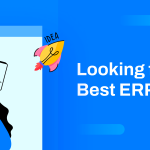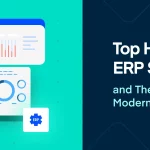We are living in a generation where every work that we need to do demands automation and digitalization. Enterprise Resource Planning (ERP) as we call it is very much a part of that process. And with almost every organization needing to handle multiple departments in their businesses together, the importance of ERP of a company to be made up-to-date with the latest technology there is became ever so essential.
So this is the reason the market share of ERP software is booming every year.
By the year 2026, the global market of ERP Software is expected to reach $78.40 billion
Now that is quite a staggering number that one can hardly ignore, right? Well, this is the same in the case of e-commerce as well. The market share of e-commerce as well as online marketplace businesses has increased at an exponential rate in the last decade or so. And it is expected to get only bigger in the years to come. But is there really any way to properly integrate ERP with E-commerce? How should you implement an ERP solution to combine it with e-commerce to run the business effectively? These are the question’s answers that we will be trying to find today.
So let’s find the answers, but before that, we should also know the:
Key Benefits of Integrating ERP With E-Commerce

It is true that many businesses overlook the idea of integrating ERP with e-commerce purely due to the cost factor caused by too many modifications required to be done in the current system. But when they list out its benefits looking at the big picture, almost everyone realizes the worthiness of this integration without raising any questions about its cost ever again. So how does it really help after successfully integrating ERP with e-commerce? Well, here is a list of all the major benefits of it:
- Provide support to manage data of the existing customers, products, sales, accounts, inventory, shipping, etc.
- Better visibility of sales and demand reducing the inventory cost.
- Inform the customers about the whereabouts of their shipment
- Generate better customer, sales & account report.
- .Streamlines the whole process of sales from website till delivery
- Reduces human involvement, redundancy & error from manual entry
- Improves the productivity of the whole team
- Automated tax compliance to meet the tax requirement
- Enables single portal product delivery tracking for customers.
- Last but not least, boosts the profit & revenue by allowing users to manage multiple online & offline channels of sales.
Integration Challenges to Keep in Mind

The quality assurance team who are responsible for the testing must test the integration of the ERP system with the online store before it is set up live. It is no doubt very necessary to understand the whole process better and to make sure the data processed in the function are accurate. Once the ERP in E-commerce is successfully integrated & tested, then all the details of every transaction will be automatically updated.
And now after the integration process is completed, it brings its own set of challenges. We know nowadays the software solutions are so advanced that people with below-average technical knowledge are bound to suffer from system adaptation or technical challenges.
2 Primary Challenges to Overcome
More evidently these challenges mainly occur from the people using them. And there are two of such primary challenges, those are:
- The system adaptation process of the new solution & the new way the business process would get done.
- Having to make two separate teams coordinate & work as a single unit in order to get the task to be done maintaining the highest level of standards within the given deadline.
For the second challenge to overcome, you need to understand the fact that in order to get the best output from the integrated solution for the customer, one would need to make sure both the team is working with the common goal in mind. They need to have a similar way of getting things done setting all their eyes on the same goal for the company.
When the members can stay on the same page following the same methodology, only then the challenges from the implementation side can be slowly but gradually overcome.

On the other hand, to overcome the first challenge, you will need to arrange a training facility for your employees to understand the new solution fully. You have to be patient and provide them enough time to get used to the new way of working after the integration between ERP & E-Commerce.
Only then this new integration can prove to be beneficial for the company in the long run. As we all know new solution could possibly get your business optimized opening door for more new possibilities in the near future.
Moreover, overcoming the challenges better also depends on how well you have strategized the whole process of implementing ERP in E-Commerce. Which brings us to our next section of the discussion.
Implementation and Strategies of ERP in E-Commerce

Technology naturally becomes more flexible over time. So once you get used to the technology implemented, your work becomes much easier to operate & manage. For all integrated solutions, there is a definite implementation process and strategies that must be followed to get the best result. This is not different for ERP & E-commerce integration.
So therefore in order to make a better integration between the two platforms, the following implementation methodology and strategies could be considered.
Various Organizational Department Optimization & Reorganization
The whole enterprise is required to have coordinated operation due to the integration of ERP & E-commerce. In order to build a new business philosophy, companies must look to develop the existing business model, move out from the traditional style of work. Moreover, they should adjust their staffing and improve restructuring.

Furthermore, to serve any businesses better, the continued development of e-commerce is required as any change in the business model is bound to have a significant impact on the whole e-commerce structure setup.
A moral circle is formed between ERP and e-commerce solution with such reconstruction of enterprises and more significantly, this promotes an organized development of both the sides, as well as the sound growth of the business.
Apply Point-To-Point Connectors
For smaller businesses, this implemented solution is quite an affordable option. In order to keep the data sync and have an exchange of information, the unit of e-commerce of your business is designated at your ERP in a point-to-point connector.

This works as a simplification of the management process and any extra effort required into management in between the system eliminates the data that is working as a ‘middleman’
In terms of maintaining smaller operation, this can be considered plenty or any company that is having a slow and steady sales. But in case your enterprise is facing a radical growth and you can predict additional sales scope in the near future then it is better to choose an ERP solution that can be scaled up along with your business without needing for you to reconfigure every time you decide to make the expansion of the business.
Integrated Module-based Software
In order to achieve the aspects of these two integration, in case of ERP, preferences should be given to modules like accounts, sales, marketing, inventory, procurement, and production plan that are closely linked to cash flow capital and logistics of the business.

While in the case of e-commerce, the application software module priorities should be given to modules of customer relationships management, resource management, website maintenance & management, online purchasing & sales management, and lastly online payment management. Therefore a new application system should form with the integration of the two modules.
Customary Integration of ERP E-commerce
Even though it might be more time-consuming and expensive, but if your backend requires special handling then custom E-commerce-ERP integration might just be the kind of implementation you need.
Say, in the backend of your system, there are a number of API based application that is required to be integrated individually in order to maintain a seamless flow of data to and from the enterprise’s many data hub.
This can only be a good option if your business actually runs like no other, otherwise, there is no point in wasting additional time and funds behind it, even a standardized method can still do a great job for you.
Management Through Multichannel Platform
For a standard type of E-commerce-ERP integration, this implementation option is most suitable as from multiple channels, it provides a hub between the system and synchronizes the data. For both setup, the cloud-based multichannel management platforms award with the best of its affordability as well as the powerful possibility of streamlining your operation.

There is every chance that a mistake is waiting for it to happen when there is a lack of automation for system integration. In order to help your business to flourish in support of future growth, you are required for a strategy of e-commerce that stands as it is today as well as how it will emerge in the near future.
The ERP integrations with e-commerce can enable you to enjoy good data integrity, repetitions, and sinkholes of productivity removal, have efficient developing growth of the business and offers better customer support service which can eventually improve brand loyalty keeping the sales of your business entities at its all-time peak.
Change in Traditional Views
With the current ERP with E-commerce integration in place, there is every chance to affect the overall environment inside, that involves all the critical aspect of the company that is responsible to bring significant changes within the enterprise. In a simpler term, this is certainly going to put an impact on the existing management systems, ideas, and methods.
More essentially, it is obligated to encounter a number of hurdles, as this sudden transformation is going to cause a benefit redistribution process imposed on many people. Moreover, before changing their ideas & accepting the advanced management concepts, the top decision-making authority needs to adequately promote the leaders of the business, management team, employees.
The employees need to have the right knowledge and idea of the ideology and accept the advanced management theory. As a result of that, it will totally increase the response speed to the dynamic market of the enterprise.
A Complete ERP Solution Is Your Answer to a Right Implementation

All through the post, we have tried to discuss and highlight the basic idea of implementing ERP in E-commerce. But with globalization kicking in the market among most business industries, it became ever so important to look for a comprehensive ERP solution to stay ahead of the competitors that provide them a substantial lead from others.
For many companies, this can only be achieved through the proper use of ERP. And every conventional ERP management calls for a suitable ERP solution. So, therefore, the right implementation of ERP in E-commerce can also be accomplished by utilizing a reliable ERP solution, and in this regard, the complete business management tool like WP ERP can be your life savior.

For any business to run smoothly, be it e-commerce or any other form of business you require to manage very department efficiently, starting from the HR management to Customer Management and inventory management to accounts management.
And so this is when WP ERP can be your all-in-one ERP solution as it seamlessly integrates with your business’s human resource, customer relationship, inventory, accounts, marketing, and sales.
What ideas of ERP implementation did you apply for your business? Do you have anything more to add? Feel free to share your thoughts and ideas with us in the comments below.








